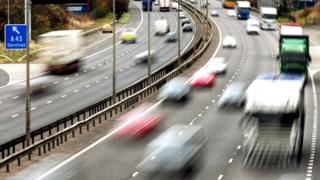 Image copyright PA
Image copyright PACar makers and safety experts are arguing about the best technology to curb speeding on Europe’s roads.
The EU is proposing kit that renders the accelerator pedal temporarily unresponsive when the speed limit is reached.
The driver has to push hard on the pedal to de-activate the system and deliberately break the limit.
Car makers suggest the cheaper option of a bleeping light on the dashboard.
The issue will be debated at a meeting of EU technical experts on Thursday. Whichever system is chosen could apply in the UK, despite Brexit.
What’s at stake?
Each side says their proposed system will annoy drivers less.
The safety experts say their tests show drivers are irritated by the bleep, so they’ll just turn the system off when they arrive at the car.
They say the smart throttle doesn’t annoy drivers so much.
Dudley Curtis from the European Transport Safety Council (ETSC) told BBC News: “We are concerned that the final outcome of this debate might be a weakened version of the system which has far lower life-saving potential.”
The car makers’ association ACEA maintains that it supports safety innovation too.
A spokesperson told BBC News it wants a “cascading” system, with a warning light, followed by a beep OR a pedal response.
It said: “The system needs to be accepted by drivers as much as possible. To that end, ACEA supports the most flexible approach to driver feedback, with a cascaded warning system – first visual, then acoustic or haptic (touch)”.
‘Huge savings’
ETSC says this three-part system will be too slow to alert drivers. It says trials with the beep have just annoyed drivers, especially if they have a passenger onboard.
The stakes are high. Huge benefits are envisaged for the planned safety changes – not just a reduction in accidents but also lower emissions from eliminating stop-start driving, and calmer cities for pedestrians and cyclists.
Safety experts say the innovations would also present a huge saving to local councils which wouldn’t need to install speed bumps.
The safety scheme is proposed to include a host of measures, including:
- Autonomous emergency braking informed by on-board cameras
- Pedestrian and cycle recognition
- Drowsiness warnings
- Lane departure warnings
The plan would also include lower cabs for trucks, and blind spot warnings for lorry drivers.
The standards need to be resolved by April 2021, for car manufacturers to install the technology on any new models from 2022. So, Thursday is a key moment.
‘Massive improvement’
Oliver Carsten from Leeds University trialled the so-called “Intelligent Speed Assistant” accelerator pedal. He told us: “It gave us a massive improvement in speed compliance with UK drivers, especially on urban roads.
“We fear that replacing it with a beeping system will just annoy drivers, so they will mute it as soon as they step into the vehicle.”
EU Commissioner Elzbieta Bienkowska said: “Every year, 25,000 people lose their lives on our roads. The vast majority of these accidents are caused by human error.
“With the new advanced safety features that will become mandatory, we can have the same kind of impact as when safety belts were first introduced.”
The new system was agreed in principle when the UK was still in the EU, but the British government won’t commit to adopting the new standards until it can see the shape of its future trade deals.
The measures are not being adopted in the USA, although ETSC says it’s been told by American car makers that the technology could be fitted easily.
Follow Roger on Twitter @rharrabin
Click Here to Visit Orignal Source of Article https://www.bbc.co.uk/news/business-54454738


